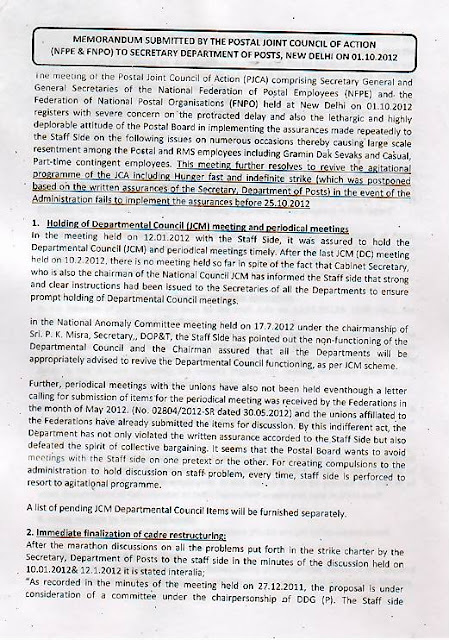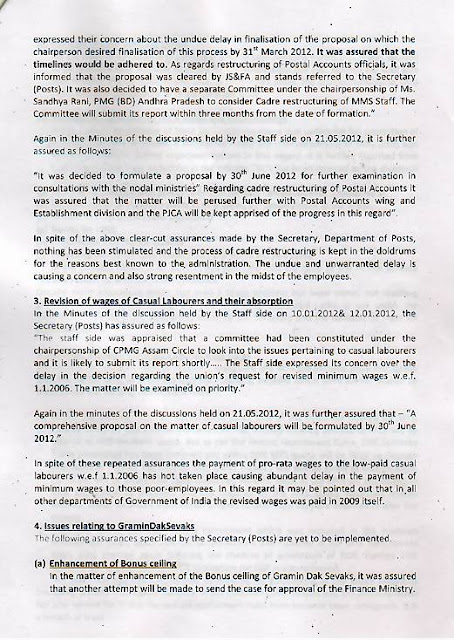The Points stressed in the meeting held on 01.10.2012 with
the Secretary and Postal Board Members on the revised postal board policy
2012 by the Secretary General and General Secretaries of NFPE is recorded in a
form of letter addressed to Postal Board. The letter is reproduced here under
for the consumption of all viewers.
NATIONAL FEDERATION OF POSTAL
EMPLOYEES
(Central Heads Quarters)
1st Floor, North Avenue Post
office, New Delhi
– 110001
Ref: NFPE/NPP 2012/GENL/2012
Dated
01.10.2012
To
Mrs. Suneetha Trivedi
Member (Planning)
Postal Services Board
Dak Bhawan, New
Delhi – 110001
Madam,
Sub: - Discussion on National Postal Policy 2012.
Ref: - (i) Your DO No. 27-69/2011 dated
18.09.2012
(ii) Meeting held at Dak Bhawan on 01.10.2012
Kindly refer to the proceedings of the meeting held at Dak
Bhawan under the Chairpersonship of Secretary, Department of Posts on
01.10.2012, on the above subject. The viewpoints expressed by the NFPE and its
affiliated unions on the specific issues of unbundling of functions and
introduction of an independent regulator for Indian Postal market is
summarized below:
(a) Theory of level
playing field and its negative impact in the Indian situation
In the National Postal Policy 2012 it is stated that it is
essential to allow free interplay of market forces and consequent stabilization
of the Postal market. This means opening up of entry in the Postal market for
national/international courier companies by granting licence for which
amendment to the Indian Post office Act 1898 is a must.
In India more than 70% of the population lives in rural
villages and the Department of Posts is the sole service provider in the rural
areas, through it’s a vast network of more than 1,55000 post offices. It is an
admitted fact that, even now couriers are not providing postal services in the
rural areas. On getting licence they will restrict their area of operation to
the metro cities/cities and shall capture a major share of Postal sector
revenue. About 70% of the revenue of India Post is from metro cities/cities.
The remaining rural villages where 70% of the population resides is
contributing less than 30% of the revenue earned by India Post.
If competition is allowed, it will never be a fair
competition in a level playing field. Aggressive competition will take place in
the profit making city areas and vast majority of the loss making rural areas
will be left to the India Post. This will result in further increasing the loss
incurred by the Postal Department and will lead to the natural death of the
India Post within a short span of time as the slogan is – “survival of the
fittest.”
The experience in the telecom sector clearly manifested that
the private telecom operators never cared to provide landline connections in
the rural areas, inspite of inclusion of a separate clause to this effect in
the licences granted to them, instead they opted to pay the meagre amount of
fine imposed on them for violation of the compulsory clause of provision of
rural landline connections. The Government and the regulator has always taken a
lenient view towards private operators. In the Postal also the same thing will
happen.
(b) Amendment to the
Indian Post office Act 1898
We do agree that many of the clauses of the Indian Post
office Act 1898 has become obsolete and many changes are to be incorporated
therein, especially in the context of induction of Information and
Communication Technology (ICT) in the Postal Services. But the amendment
envisaged in the National Postal Policy 2012 is quite unwarranted. By amending
the Act, the Government want to end the monopoly of the Department of Posts in
collection, processing, conveyance and delivery of letter mail articles. This
is mainly to facilitate entry of the private courier companies to compete in
the letter mail sector.
Earlier also Government has brought a bill called “Indian
Post office Act Amendment bill” in the Parliament for this purpose. The bill
was referred to the Standing committee of Ministry of Communications and IT.
The Committee after hearing all the stake holders including the courier
companies had given its report in which it was clearly recommended that the
exclusive privilege of collection, processing, conveyance and delivery of
letter mail articles should remain with the Postal itself. This being the
position the present move to again bring an amendment is against interest of
the people at large and the customers in particular. It is pertinent to mention
that in many foreign countries, the exclusive privileges of letter mail is
being preserved with the Government function and the existing right shall not
be removed at any cost.
(c) Road map to privatisation
Government of India wants to open or liberalise
the Indian Postal Sector for providing unhindered entry of the private sector.
In the long run, the Government may withdraw from its responsibility to provide
postal services to the public through Govt. owned Department of Posts. The
ultimate aim and hidden agenda of the National Postal Policy 2012 is to give
maximum patronage to the private sector and the “public-private partnership”,
“unbundling of functions” etc are mainly intended for achieving this goal.
In the telecom, the government refused to grant permission
to the Government owned BSNL for providing the value added cellular mobile
services in India.
Licences were granted to all other private cellular mobile companies and they
charged exhorbitant rates for incoming and outgoing calls. Only after six
years, that too after prolonged struggle by the BSNL employees and due to
mounting public opinion, the Government reluctantly granted licence to BSNL
also. If this can happen in Telecom, one can very well imagine what will be
attitude of the Government and the fate of Department of Posts.
(d) We oppose the neo-liberal
reforms
NFPE
as an organisation of the Postal employees has been fighting against the
neo-liberal globalization policies of the Government of India from 1991
onwards. When many countries where this reforms are implemented are reverting
back, we are at a loss to understand why Government of India is going ahead
with the reforms in the Indian Postal Sector. In fact, in the preamble of the
draft National Postal Policy itself it is admitted that – “though the
principle of separation of regulator and operator is widely discussed, it is
yet to find universal acceptance”
In
the above circumstances going ahead with the institutional reforms such as
unbundling of functions i.e.; operation, regulation and policy making in the
Postal Sector will be suicidal. We strongly oppose unbundling and setting up of
separate regulator.
(e) Department of Posts can
itself regulate the Postal market in India
Instead of creating a separate regulator, the Department of Post itself can
regulate the Postal market by framing necessary rules and by increasing the power
of the Postal Board and at the same time keeping its monopoly over the letter
mail.
In view of the above NFPE demands the Government of India
and the Postal Administration to desist from any move to unbundle the functions
and also from the move to appoint separate regular for Indian Postal market.
Yours faithfully,
(M. Krishnan)
Secretary General, NFPE


















